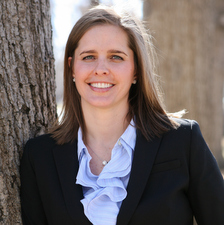The 2015 session of the Colorado Legislature convened this week, and the state’s golf community plans to be more than merely interested observers.
With several issues very relevant to the game of golf definitely or possibly coming up during this year’s four-month session, the Allied Golf Associations of Colorado will have a representative looking out for their interests at the Statehouse in Denver.
Jennifer Cassell (pictured), a lobbyist who also recently has worked part-time on the CWGA staff, was retained by the Allied Golf Associations in the fall, and she could very well continue in an advocacy role on an ongoing basis.
“We want to be out ahead of issues and be in a position to react” in a timely manner to bills that affect Colorado golf in the State Legislature, CGA executive director Ed Mate said. “This way, we’ll have an oar in the water at the state capitol.”
The main impetus to have representation at the Legislature starting now is that the Pesticide Applicators’ Act has a sunset provision, meaning that in this session lawmakers will review it and vote on renewing the act, possibly with some changes from previous incarnations.
The Colorado golf industry is hoping that the Legislature will follow the recommendation issued in October by the Colorado Department of Regulatory Agencies (DORA), which wants the act to continue for another nine years, until 2024, while requiring some applicators to receive additional training prior to pesticide use. A bill will likely come forward in the State Legislature sometime between mid-January and early February, Cassell said.
“I’ll obviously have an eye on the pesticide bill,” she said this week. “When I hear it’s in committee, I’ll ask (representatives of) the golf associations — possibly the golf course superintendents and maybe Ed Mate and Eddie Ainsworth (executive director of the Colorado PGA) — to come and testify.”
Other issues of particular interest to the Colorado golf industry that could come up in a given session are bills related to water usage, certain contract employment legislation, and tourism.
“There are generally 700 or so bills that are introduced and debated each session,” said Cassell (pictured at left at the Statehouse). “I’ll be both actively lobbying and keeping track” of key issues for the Allied Golf Associations. “We want to raise awareness of golf industry issues and be more involved in the legislative process. All sorts of things happen at the state capitol that can have a real impact.”
The push for retaining a legislative advocate at this point came from the Rocky Mountain Golf Course Superintendents Association, which sees the responsible application of pesticides by professionals as being crucial to course maintenance. And with some environmental groups expected to advocate for change in the Pesticide Applicators’ Act, the golf community wanted its voice heard as well.
“It has the potential to have a very large impact on golf,” Mate said of the act. “Without the prudent application of chemicals, golf is in big trouble.”
Cassell’s background makes her a good fit to advocate for the golf industry. She played college golf at the University of Kansas in the early 2000s and has spent time working in a golf shop and mowing greens and tees. She’s a volunteer assistant coach for the women’s golf program at the University of Denver, where she earned a Masters degree. And after serving on the CWGA board of directors, Cassell joined the association’s staff last year as programs associate when the CWGA became short-staffed.
As a lobbyist, Cassell works for the firm Tomlinson & Associates, advocating on behalf of agriculture issues, economic development, insurance and higher education. This is her fourth state legislative session serving as a lobbyist, and she’s done work at the state capitol in Kansas and Colorado for over a decade, including for Gov. Hickenlooper.


